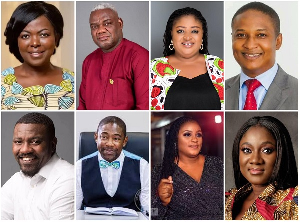I think the Ghana News Agency (GNA) reporter who wrote the piece captioned "Mrs. Sinare's Paternity News For The Unknown Son Of Osagyefo" (Modernghana.com 8/3/15) gave the article the obviously wrong title. It also may well have been a GNA editor who composed such misleading caption. For the information of Nana Kodjo Jehu-Appiah whose name bylines the article, Dr. Onzy Nathan Kwame Nkrumah has always known his paternal identity, at least as captivingly narrated by 89-year-old Mrs. Souad Mohammed El-Rouby Sinare, who is herself of Egyptian birth and reported to be the widow of Major Saleh Said Sinare, said to have been the first Chief Imam of the Ghana Armed Forces.
Indeed, the Nkrumah scion for whom this brief narrative ought to have been directed as an epistolary advice is Mr. Sekou Nkrumah, the second son of Ghana's infamous dictator by his Egyptian wife, Mrs. Fathia Rizk, who has publicly and virulently disputed the cognate paternaity of his elder half-brother Onzy. Sekou has even demanded a DNA-Test to put paid to the Onzy Nkrumah Conundrum, even after Nana Bulumia Twum, a nephew and head of the Nkrumah Clan had categorically stated that the paternity of Onzy Nkrumah was well beyond dispute.
It should also come as edifying news to Ms. Samia Yaba Nkrumah and the fanatical Nkrumacrats who have been touting the Italian-married / -husbanded Chairperson of the rump-Convention People's Party (r-CPP) as "the only daughter" of Ghana's first postcolonial leader. I have in the past vehemently disputed this patently false version of the reality, and even insisted that there was an Nkrumah daughter, much older than Samia and a near-contemporary of my late mother's, who lived right here in New York City and was also a good friend of the old lady's. Indeed, more than several times during the 1980s and 1990s, that is, until her passing in March 1998, I saw and heard my mother spend a couple or so hours at a time on the phone chatting with this daughter of President Nkrumah. It would usually be on weekends.
Their conversations piqued my attention because they took unusually long; I had gotten to gauge the nature and extent of her relationships with her interlocutors on the other end of the line by the length of chat-time. My mother also invariably played the role of either a big sister or benevolent counselor whenever she spoke to the aforesaid Nkrumah daughter on the phone. I would often hear my mother say things like "But at least your father supported you and your mother financially, and even built a house for you. What else was he supposed to have done for you, knowing him to have been such a busy and restless man?"
In fact, it was during one of such moments of ripostes that I asked my mother who was the person on the other end of the line and was told that it was a daughter of Kwame Nkrumah by a mistress from the Akuapem "mountains." She must have even told me her name, but I have, of course, been too busy with my own worldly cares to remember the same. Besides, my increasingly painful knowledge and awareness of the raw deal meted Dr. J. B. Danquah by Mr. Nkrumah did not endear me to Nkrumah-phernalia, or things Nkrumah. I am not, however, fully convinced that Mrs. Sinare's version of the Nkrumah genealogy is the complete story or narrative.
I tend to believe hers is the Egypto-Ghanaian version of the Nkrumah genealogy. There very well may be other versions just as compelling as Mrs. Sinare's that have yet to be fully and thoroughly researched, publicly disclosed and dispassionately discussed. In other words, while I do not have the evidence yet, nevertheless, my extensive studies on the life and politics of the man lead me to believe that the six names, so far, affirmed by Mrs. Sinare to be the offspring of President Nkrumah - namely, Dr. Francis Nkrumah, Mr. Gamel Nasser Nkrumah, Mr. Sekou Nkrumah, Ms. Samia Yaba Nkrumah, and Mrs. Elizabeth Koranteng - are not all that there is to the Nkrumah Family, as opposed to the Nkrumah Clan, or genealogy.
The avid Nkrumah student in me tells me that it is important to know whether Ghana's first postcolonial leader had six children, and not the four that studiously ignorant Nkrumah fanatics have been adamantly promoting for quite awhile now. On the other hand, the Ghanaian in me tells me not to gullibly consume this expediently and suavely crafted Nkrumaist genealogy too seriously. The man was a remarkable Cassanova who was widely known to have strategically encouraged his point-men and other key operatives of his Convention People's Party to "take good care of [Ghanaian] women" as an epiphenominal or corollary gambit towards the grand CPP agenda.
Then also, the 1940s, 50s and 60s in the erstwhile Gold Coast and Ghana were not known to be very much prophylactically savvy or conscious. Which is not necessarily to say that Mr. Kwame Nkrumah was an obstreperous lecher, in classical Soyinkan parlance.
_______________________________________________________________
Opinions of Sunday, 9 August 2015
Columnist: Okoampa-Ahoofe, Kwame


















